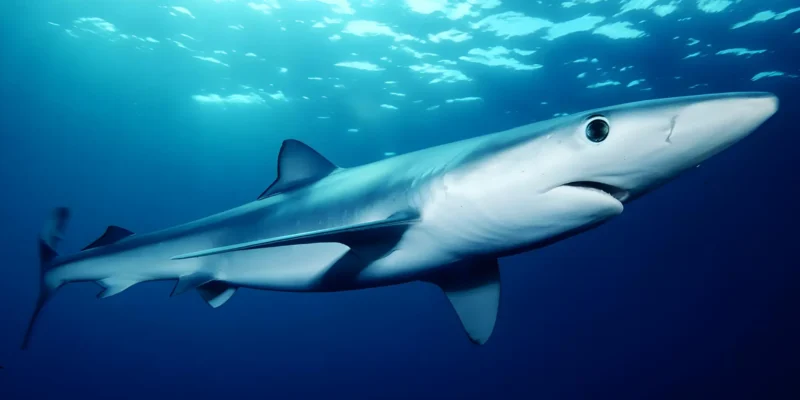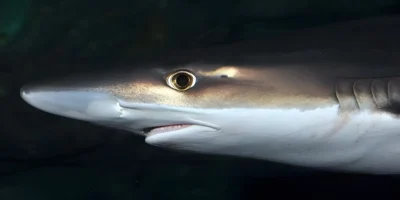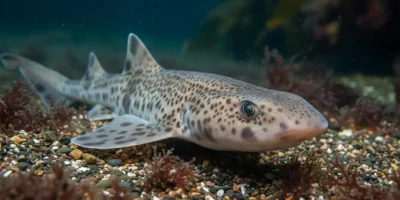The vastness of the oceans may seem endless – but they are not immune to human influence. Every year, millions of tons of plastic and synthetic fibers enter the seas, where they break down into tiny particles, travel with currents, accumulate in sediments, and infiltrate marine food webs. A recent study now shows that one of the most iconic ocean predators plays an unexpected role in this cycle: the blue shark.
New research shows that the intestines of blue sharks act like temporary collection containers, holding fibers long enough to accumulate considerable amounts. Their epic migrations mean they can spread these particles across entire ocean basins – far from their original source. And it’s not just plastic we need to worry about.
Migrating trash distributors of the seas
Blue sharks (Prionace glauca) are among the most common shark species in temperate and tropical waters and are often caught as bycatch in tuna longline fisheries. Their diet is varied – they eat fish, cephalopods, and crustaceans – and they travel hundreds or even thousands of kilometers each year.
A research team led by Chenxuan Du from Shanghai Ocean University in China analyzed the intestines of blue sharks and found both plastic and non-plastic particles in every section of the spiral-shaped organ. The highest concentration was found in the posterior section. On average, a single intestine contained about 11 plastic fibers and 48 non-plastic fibers.
Fibers dominated the detected mixture, accounting for more than 95 percent of the identified particles. The plastics were mainly polyester and polyethylene terephthalate, while the non-plastics included rayon and cotton – materials known to be released during washing and carried into our oceans via river systems.
Complex impacts on the marine ecosystem
The size of these fibers ranged from about 0.1 millimeters to over 8 millimeters. They are small enough to be ingested by other organisms, yet large enough to survive digestion intact. Sharks can excrete these particles kilometers away from their original point of intake, thus becoming unexpected couriers of pollution.
Diese Ergebnisse verdeutlichen, wie tief Meeresverschmutzung in Ozeanökosysteme eingewoben ist. Die Därme blauer Haie fungieren im Wesentlichen als temporäre Speichereinheiten für Müll, die sowohl Plastik- als auch Nicht-Plastikfasern lange genug festhalten, damit Forscher erhebliche Ansammlungen messen können.
“The sharks are not just passive victims of pollution – they are active participants in its spread,” explains marine biologist Melissa Cristina Márquez.
Since blue sharks migrate thousands of kilometers across entire ocean basins, these new findings add another layer of complexity to the already challenging task of tracking marine pollution. Moreover, the discussion goes beyond plastics: non-plastic fibers such as rayon and cotton are often considered less harmful because they degrade more quickly, yet many are treated with dyes, flame retardants, or other chemical additives that can be toxic.
If one of the ocean’s most mobile predators can accumulate and redistribute particles, it is likely that other pelagic species – other sharks, tunas, and swordfish – play similar roles. This means that tackling marine pollution has just become significantly more complicated.
Every fiber in the intestines of the studied blue sharks reflects an intertwined network of human activity, ocean currents, and biological systems. Each fragment is evidence that our waste does not disappear – it travels, lingers, and embeds itself in the very animals we admire. The ocean is not too vast to escape our reach, nor are its creatures.





